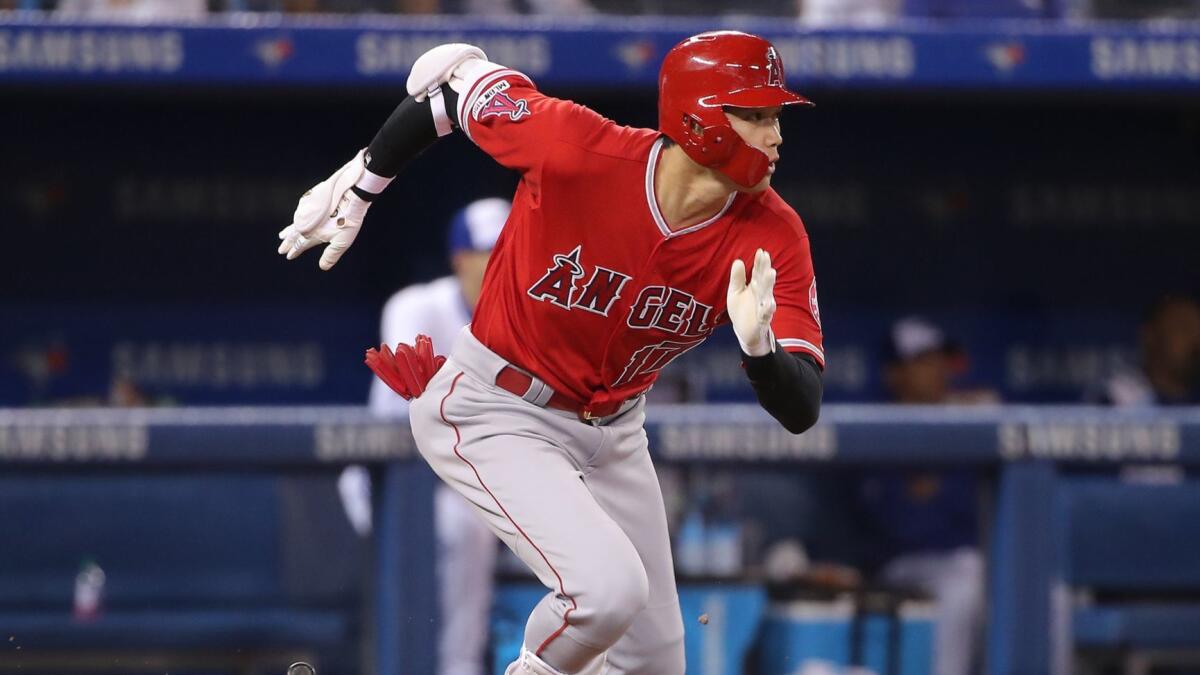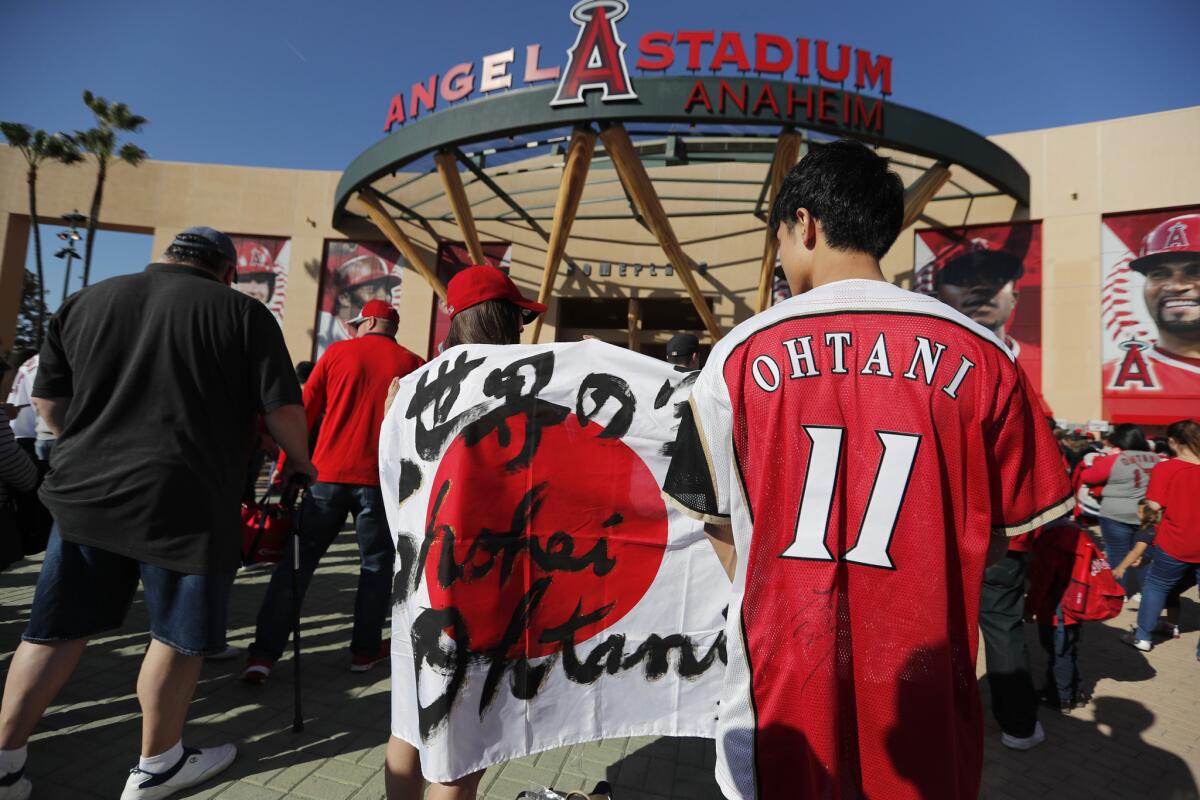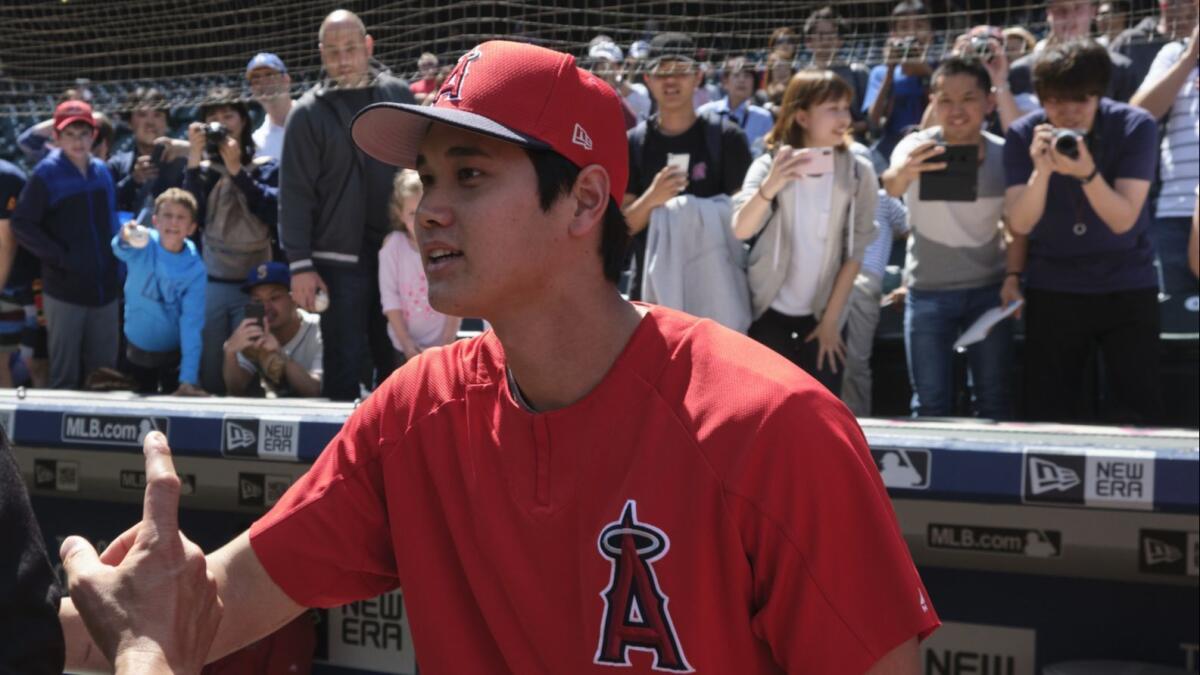Angels’ Shohei Ohtani brings in dollars as he bangs out hits

- Share via
The group sprung to its feet as one. Shohei Ohtani had just hit a home run, and nearly 100 fans — most wearing Ohtani sweatshirts — rose in celebration. There were hugs and high-fives. There was the obligatory documentation of the moment via cellphone photos.
The group had traveled from Japan to Anaheim, and they had come to Angel Stadium to see Ohtani play. In Japan, baseball games are full of joyful noise, and in particular full of song. Japanese fans do not sit quietly, especially not when their countryman is at bat.
“When I’m in the on-deck circle, I can hear all the Japanese cheering,” Ohtani said through an interpreter. “They’re supporting me — and not only at home, but also on the road. That helps me and gives me confidence.”
In a year and a half in the major leagues, Ohtani has established himself as a triple threat — as a hitter, as a pitcher and as a driver of economic impact. The fans in the Ohtani group on this June night in Anaheim all work in the travel industry in Japan, eager to leverage Ohtani’s popularity back home into a greater share of the already significant business of travel from Japan to Southern California.
“People are coming here to see him,” said Daisuke Sato, who works for a Japanese travel agency. “They go to Disney, and they see Ohtani.”
Kei Shibata, whose Tokyo-based company publishes online travel guides, said he was anxious to see where Ohtani plays so he could write authoritatively about it. He jokingly suggested what the name of a story on his website might be: “Top Things To Do in Anaheim Other Than Watching Ohtani.”
Last season as a rookie, Ohtani generated at least twice as much money for the Angels as they paid him in salary, and perhaps much more. His salary was the standard rookie wage of $545,000. (The Angels also paid him a signing bonus of $2.3 million and paid Ohtani’s Japanese team a release fee of $20 million. In return, they secured his contractual rights for at least six years.)
The Angels declined to say precisely how much revenue Ohtani generated for them. However, since they signed him, they’ve reached six new sponsorship agreements with Japanese companies, according to Angels president John Carpino.
“We’ve had several six-figure sponsorship deals,” Carpino said.
The Angels’ attendance also increased by 11% for each of the five home games in which Ohtani was the starting pitcher. If each additional fan paid the average ticket price of $30.26, as calculated by Team Marketing Report, the Angels’ ticket revenue would have increased by almost $600,000.
That figure does not account for incremental gains on the nights Ohtani batted rather than pitched, nor for the additional revenue from sales of food, drink, parking and merchandise. Major League Baseball reported that it sold more Ohtani jerseys than Trout jerseys last season, even though the popular Trout is the best player in baseball and the face of the Angels.
The Angels were not the only Orange County business to benefit from Ohtani’s arrival.
At South Coast Plaza in Costa Mesa, a luxury mall that attracts about 22 million shoppers each year, more Japanese tour groups have visited since Ohtani joined the Angels, spokeswoman Debra Gunn Downing said. Tour operators featured Ohtani on their brochure covers, she said, and a Japanese television crew tracking Ohtani shot a segment there, targeted to his fans back home.

“We have felt the Shohei Ohtani effect,” she said.
Barbara Gerovac, the co-owner of Anaheim Brewery, first noticed the effect last season, when patrons asked for identification showed Japanese passports.
The tasting room and on-site brewery is located in downtown Anaheim, four miles from Angel Stadium. For a small business — owned by a husband and wife, with 11 employees — the extra $300 or so in revenue on game days was significant.
“That’s a nice bump,” Gerovac said.
An estimated 157,000 tourists from Japan visited Anaheim during Ohtani’s rookie season last year, up about 4% from the previous two years, according to data provided by Visit Anaheim, which promotes tourism and conventions in the city and throughout Orange County.
“We have seen last year — and now that he has been activated this year — that there is a boost in visitation to games because of Shohei Ohtani,” said Charles Harris, senior vice president of marketing for Visit Anaheim.
Not every Japanese visitor wants to see Ohtani, of course. But the Angels find themselves at the fortunate front of a trend: International tourists increasingly want to experience a professional sporting event when visiting the United States, said Jeff Ajluni of the U.S. Travel Association.
A game is a slice of American culture, and U.S. leagues offer the highest level of competition in baseball, basketball and football. According to USTA data, 25% of travelers visiting the U.S. last year were interested in attending an MLB, NBA or NFL game.
The breakdown for MLB: 21% of Japanese tourists — and 11% of all international travelers — were interested in catching a game.
The trend is particularly pronounced in the regions in which international flights commonly land, including Southern California, New York and Florida. The USTA held its annual exhibition this month in Anaheim, with more than 6,000 travel industry buyers from 70 countries on hand.
Amid the displays for theme parks, historical sites and other destinations, Ajluni said, representatives from more than a dozen sports teams pitched their games as tourist attractions. The Angels were on hand, and the other teams there included the Clippers, Ducks, Galaxy, San Diego Padres, San Francisco Giants and Arizona Diamondbacks.
The Angels, at least for now, have declined to take the guaranteed revenue that would have come with an exclusive deal with a Japanese travel agency. Instead, and sometimes with an assist from the MLB office in Japan, the Angels put together customized Ohtani tour packages that can include game tickets, merchandise and stadium tours.
“We always have someone here that can speak Japanese,” Carpino said.
Ohtani, who turns 25 next month, might already be the brightest star in Japan’s formidable constellation of baseball players. He rose as the iconic Ichiro Suzuki faded and retired, and his countrymen do not travel to see him just because he shares a homeland with them. Ohtani is the rare player who pitches and hits.
“He’s a two-way player,” Shibata said. “A lot of people are very curious. It’s not just the fact that he is Japanese. He is trying something very challenging.”
Last season, Ohtani became the first major leaguer to hit 15 home runs and pitch 50 innings in the same season since Babe Ruth did it 100 years ago. He is not pitching this season while he recovers from an elbow injury.
Sign up for our daily sports newsletter »
He is expected to resume pitching next season. In a way, that makes this season ideal for Japanese travel agents: Ohtani does not need to sit out the days before and after he pitches. As a designated hitter, he plays nearly every day.
“You can put out a pamphlet: ‘Go to Los Angeles and Anaheim and see Ohtani,’ and there’s a good chance people will actually see him,” said Jungo Kikuma, chairman of the Japan Outbound Tourism Council, through an interpreter.
Japanese trips to Southern California often include excursions to Hollywood and Santa Monica, and some come with side trips to Las Vegas or Yosemite National Park, but Kikuma said theme parks such as Disneyland and Universal Studios are a primary attraction.
“There was a time when it was seen just as a place for theme parks. That’s changed, in part due to Ohtani,” Kikuma said. “The older guys, they’re not coming for the theme parks, they’re coming for other things, and Ohtani is one of them.

“And, in the Japanese travel industry, the market is led by young women. Young women don’t necessarily like all of the Japanese players playing in the United States, but they all love Ohtani. Everyone thinks he is very handsome. They’ll come to watch him play.”
Ohtani has lived in Southern California for one full season, and half of a second. So, if Japanese fans come for a week to watch him play, what else would he recommend they do beyond attend baseball games?
He laughed at the question.
“I wish someone could tell me how to spend an off day,” Ohtani said with a smile.
Sato could offer a suggestion. During his visit this month, he saw Ohtani play, but he also saw Disneyland’s latest attraction, the Star Wars land called “Galaxy’s Edge.”
“It was amazing,” Sato said. “I’m not a huge Star Wars fan, but it was like a dream come true.”
Was it better than watching Ohtani? From his seat at Angel Stadium, Sato lowered his voice. His answer was almost a whisper.
“To be honest,” he said, “yes.”
Follow Bill Shaikin on Twitter @BillShaikin
More to Read
Go beyond the scoreboard
Get the latest on L.A.'s teams in the daily Sports Report newsletter.
You may occasionally receive promotional content from the Los Angeles Times.







